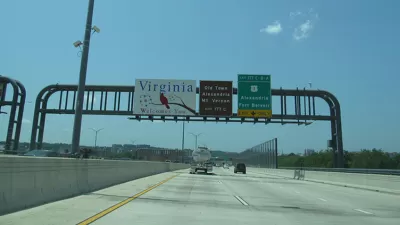States are increasingly looking to high occupancy toll lanes as a means of revenue generation as well as congestion management, as they deal with the shortfall in transportation revenue from federal and state governments. Ga. may provide a good test.
"States from California to Virginia see the lanes, often set up in partnership with private companies, as a crucial way of generating new revenue in an era of constrained budgets—even though some haven't generated the dollars they were projected to bring in. Road planners like the idea of adjusting prices to manage traffic, and they think drivers prefer the option of paying to get there faster over traditional tolls." writes Cameron McWhirter.
With HOT lanes or "Express Lanes", as transportation planners, including the Georgia Department of Transportation (GDOT) like to call them because of the speed advantage paying users enjoy, the adjacent lanes remain free or "unmanaged" and can experience congestion, especially during peak hours.
A good comparison with the revenue brought in from traditional tolls, where all lanes are tolled, will soon be available thanks to Republican Gov. Nathan Deal's promise to voters to eliminate tolls on Georgia 400. The toll plaza was shut down on November 22.
As part of an $840 million project called the Northwest Corridor [GDOT press release, PDF], "the most expensive in the state's history," HOT lanes will be installed "along 30 miles of interstates 75 and 575 in Cobb and Cherokee counties", according to the Atlanta Business Chronicle. Now Georgia "hopes some of the revenue will replace the roughly $20 million a year it used to generate from Georgia 400," writes McWhirter.
This will not be Georgia's first foray into HOT lanes. On October 10, 2011, we posted "Atlanta's New I-85 Express Lanes Off To Rough Start." Virginia appears to have experienced the same slow start with the 495 Express Lanes in northern Virginia in February, also described in October.
Yet the Virginia Department of Transportation is not deterred. In consortium with Australia-based Transurban Group Ltd, "plans to open more HOT lanes on a portion of nearby I-95.
FULL STORY: On U.S. Highways, More Fast Lanes Aren't Free

Maui's Vacation Rental Debate Turns Ugly
Verbal attacks, misinformation campaigns and fistfights plague a high-stakes debate to convert thousands of vacation rentals into long-term housing.

Planetizen Federal Action Tracker
A weekly monitor of how Trump’s orders and actions are impacting planners and planning in America.

In Urban Planning, AI Prompting Could be the New Design Thinking
Creativity has long been key to great urban design. What if we see AI as our new creative partner?

King County Supportive Housing Program Offers Hope for Unhoused Residents
The county is taking a ‘Housing First’ approach that prioritizes getting people into housing, then offering wraparound supportive services.

Researchers Use AI to Get Clearer Picture of US Housing
Analysts are using artificial intelligence to supercharge their research by allowing them to comb through data faster. Though these AI tools can be error prone, they save time and housing researchers are optimistic about the future.

Making Shared Micromobility More Inclusive
Cities and shared mobility system operators can do more to include people with disabilities in planning and operations, per a new report.
Urban Design for Planners 1: Software Tools
This six-course series explores essential urban design concepts using open source software and equips planners with the tools they need to participate fully in the urban design process.
Planning for Universal Design
Learn the tools for implementing Universal Design in planning regulations.
planning NEXT
Appalachian Highlands Housing Partners
Mpact (founded as Rail~Volution)
City of Camden Redevelopment Agency
City of Astoria
City of Portland
City of Laramie




























